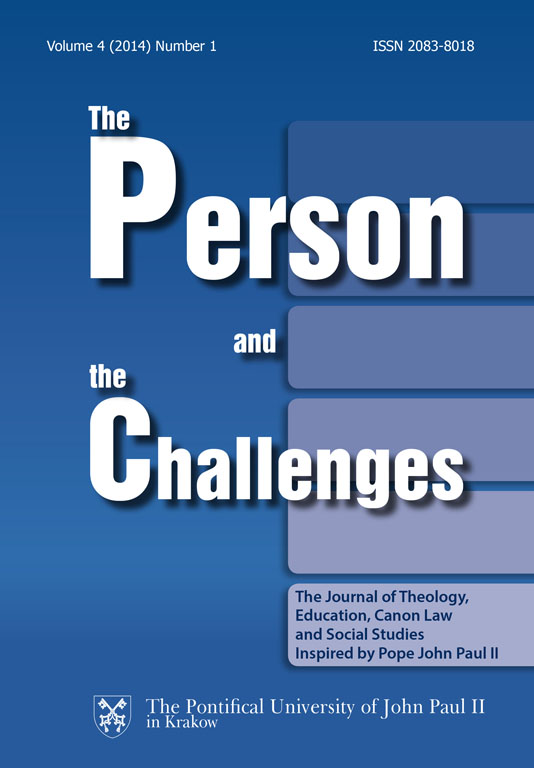L’umanesimo post-moderno, sfida all’educazione cristiana
DOI:
https://doi.org/10.15633/pch.43Słowa kluczowe:
Postmodern humanism, religious pluralism, Christian EducationAbstrakt
The XX century, in the Western countries, offered a profusion of conceptions, frequently similar in the tension they generate, but almost never exempt from strong ideological premises, and most of all inconclusive and discordant in their practical applications. The beginning of the new Millennium, almost as a reaction, has developed an utopia of a new, so called, postmodern humanism. These conceptions are not antireligious, but rather postsecular. They represent a considerable challenge to the Christian Churches’ educational tradition, that in turn are convinced to possess (as a monopoly?) the universality of the symbolic goods. It is a challenge on the ground of values and ultimate goals (problem of the ethical and religious pluralism, freedom of religion and belief, new paradigm of the relationship science-faith), but also a challenge on the field of educational procedures and institutional frameworks (conflict between public and private, relevance of the media pervasiveness, primacy of the instrumental knowhow over the humanistic one, the cultural generational gap, etc…). Among the conditions to confront this educational challenge in a correct manner, the article strongly suggests, in order to handle the new complexity of the reality, to adopt a strategy of graduality, to reinstate at the centre of one’s thought and life the formation of an ethic of responsibility.
Bibliografia
Baumann G., L’enigma multiculturale. Stati, etnie, religioni, Il Mulino, Bologna 2003 (ed. or. The multicultural Riddle. Rethinking national, ethnic and religious identities, Routledge, London 1999).
Bindé J. (ed.), Où vont les valeurs? Entretiens du XXIe siècle, UNESCO-Albin Michel, Paris 2004.
Bolgiani F., Ferrone V., Margiotta Broglio F. (eds.), Chiesa cattolica e modernità, Il Mulino, Bologna 2004.
Borgman E., Scatena S., Susin L.C. (eds.), Quali eredità per il futuro?, “Concilium” 45 (2009) 2.
Boudon R., Croire et savoir. Penser le politique, le moral et le religieux, PUF, Paris 2012.
Caimi L., Cattolici per l’educazione, La scuola, Brescia 2006.
Cobalti A., Globalizzazione e istruzione, Il Mulino, Bologna 2006.
Denis J.-P., Nouchi F. (eds.), L’Atlas des utopies, coéditeurs Le Monde-La Vie, Paris 2012.
Dotolo C., Cristianesimo e interculturalità, Cittadella, Assisi 2011.
Moratalla A.D., Ciudadanía activa y Religión. Fuentes pre-politicas de la ética democrática, ed. Encuentro, Madrid 2011.
Morin E., La Voie, Fayard, Paris 2011.
Pajer F., Filoramo G., Tante religioni un solo mondo. Pluralismo e convivenza, SEI, Torino 2010.
Pajer F., Scuola e religioni tra identità e alterità, “Pedagogia e vita” vol. 69 (2011) 1, p. 125–146.
Pajer F., Le jeu des problématiques européennes. Laïcités, pouvoirs, savoirs, in Collès L. et Nouailhat R. (dir.), Croire, savoir : quelles pédagogies européennes ?, « Lumen Vitae », Bruxelles 2013.
Römelt J., Etica cristiana nella società moderna – 1.Fondamenti, Queriniana Brescia 2011 (ed. or. Christliche Ethik in moderner Gesellschaft – 1.Grundlagen, Herder, Freiburg im Breisgau 2008).
Sobrino J., Wilfred F. (eds.), Cristianesimo in crisi?, “Concilium” 41 (2005) 3.
Van Zanten A. (dir.), Dictionnaire de l’éducation, PUF, Paris 2008.
Vivarelli R., I caratteri dell’età contemporanea, Il Mulino, Bologna 2005.
Zamagni S., Guarnieri A. (eds.), Laicità e relativismo nella società post-secolare, Il Mulino, Bologna 2009.
Pobrania
Opublikowane
Numer
Dział
Licencja
Prawa autorskie (c) 2014 Flavio Pajer

Utwór dostępny jest na licencji Creative Commons Uznanie autorstwa 4.0 Międzynarodowe.
Autorzy publikujący w czasopiśmie udzielają jego wydawcy zgody o następującej treści:
- Autor zachowuje autorskie prawa majątkowe do utworu, a jednocześnie udziela wydawcy czasopisma zgody na jego pierwszą publikację w wersji drukowanej i wersji online na licencji Creative Commons Uznanie autorstwa 4.0 Międzynarodowe oraz zgody na wykonywanie opracowań, w tym przekładów.
- Autor ma możliwość udzielania zgody niewyłącznej na opublikowanie utworu w wersji, która ukazała się w czasopiśmie (np. zamieszczenia go w repozytorium instytucjonalnym lub opublikowania w książce), wraz z informacją o jego pierwszej publikacji w czasopiśmie.
- Autor może umieścić swój utwór online (np. w repozytorium instytucjonalnym lub na swojej stronie internetowej) jeszcze przed zgłoszeniem utworu do czasopisma.

